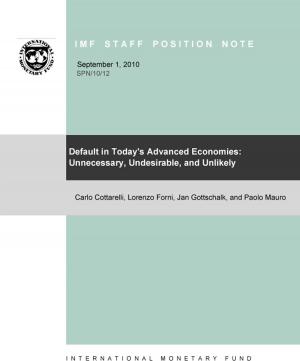| Author: | Jun Mr. Kim, Atish Mr. Ghosh, Mahvash Saeed Qureshi, Jonathan Mr. Ostry | ISBN: | 9781455258734 |
| Publisher: | INTERNATIONAL MONETARY FUND | Publication: | September 1, 2010 |
| Imprint: | INTERNATIONAL MONETARY FUND | Language: | English |
| Author: | Jun Mr. Kim, Atish Mr. Ghosh, Mahvash Saeed Qureshi, Jonathan Mr. Ostry |
| ISBN: | 9781455258734 |
| Publisher: | INTERNATIONAL MONETARY FUND |
| Publication: | September 1, 2010 |
| Imprint: | INTERNATIONAL MONETARY FUND |
| Language: | English |
In this note, the authors reexamine the issue of debt sustainability in a large group of advanced economies. Their hypothesis is that, when debt is in a moderate range, its dynamics are sustainable in the sense that increases in debt elicit sufficient increases in primary fiscal balances to stabilize the debt-to-GDP ratio. At high debt levels, however, the dynamics may turn unstable, and the debt ratio may not converge to a finite level. Such a framework allows the authors to define a “debt limit” that is consistent with a country’s historical track record of adjustment in the sense that, without an extraordinary fiscal effort, any debt increment beyond this limit would cause debt to increase without bound. This debt limit is not an absolute and immutable barrier, however, but rather defines a critical point above which a country’s normal fiscal response to rising debt becomes insufficient to maintain debt sustainability. Nor should this debt limit be interpreted as being in any sense the optimal level of public debt. Indeed, since this limit delineates the point at which fiscal solvency is called into question—and the analysis abstracts entirely from liquidity/rollover risk—prudence dictates that countries will typically want to be well below their debt limit. Given a country’s normal pattern of adjustment, “fiscal space” is then simply the difference between its debt limit and its current level of debt.
In this note, the authors reexamine the issue of debt sustainability in a large group of advanced economies. Their hypothesis is that, when debt is in a moderate range, its dynamics are sustainable in the sense that increases in debt elicit sufficient increases in primary fiscal balances to stabilize the debt-to-GDP ratio. At high debt levels, however, the dynamics may turn unstable, and the debt ratio may not converge to a finite level. Such a framework allows the authors to define a “debt limit” that is consistent with a country’s historical track record of adjustment in the sense that, without an extraordinary fiscal effort, any debt increment beyond this limit would cause debt to increase without bound. This debt limit is not an absolute and immutable barrier, however, but rather defines a critical point above which a country’s normal fiscal response to rising debt becomes insufficient to maintain debt sustainability. Nor should this debt limit be interpreted as being in any sense the optimal level of public debt. Indeed, since this limit delineates the point at which fiscal solvency is called into question—and the analysis abstracts entirely from liquidity/rollover risk—prudence dictates that countries will typically want to be well below their debt limit. Given a country’s normal pattern of adjustment, “fiscal space” is then simply the difference between its debt limit and its current level of debt.















